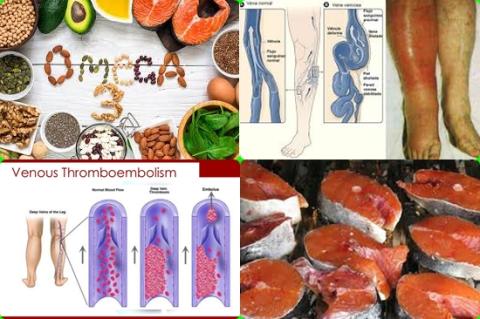
Objectives:
Is fish or omega-3 fatty acids consumption associated with a lower risk of venous thromboembolism (VTE)?
Study design:
This review article included 8 prospective cohort studies.
The follow-up duration ranged from 0.5 to 19 years.
The sample size ranged from 595 to 80,263.
The fish and omega-3 fatty acids consumption was assessed by food-frequency questionnaire (FFQ) in all studies.
The diagnosis of venous thromboembolism was obtained in registered medical record (imaging or autopsy) and food was considered as the source of omega-3 fatty acids in all included studies.
Begg's rank-correlation test showed no evidence of publication bias.
Results and conclusions:
The investigators found the overall multi-variable adjusted RR showed no significant relationship between fish consumption and the risk of venous thromboembolism [RR = 1.02, 95% CI = 0.93 to 1.11, p = 0.709, I2 = 33%, p = 0.176].
The sensitivity analysis showed only minimal changes in magnitude of the pooled RR when any study was excluded from the meta-analysis, suggesting that no individual study had excessive influence on these robust aggregate results.
The investigators found the overall multi-variable adjusted RR showed that omega-3 fatty acids consumption was associated with a lower risk of 11% for venous thromboembolism [RR = 0.89, 95% CI = 0.80 to 0.98, p = 0.024, I2 = 0%, p = 0.469].
The sensitivity analysis showed only minimal changes in magnitude of the pooled RR when any study was excluded from the meta-analysis, suggesting that no individual study had excessive influence on these robust aggregate results.
The investigators found the overall multi-variable adjusted RR showed that omega-3 fatty acids consumption was associated with a lower risk of 55% for recurrent venous thromboembolism [RR = 0.45, 95% CI = 0.25 to 0.81, p = 0.008, I2 = 26.4%, p = 0.244].
Significant because RR of 1 was not found in the 95% CI of 0.25 to 0.81. RR of 1 means no risk/association.
The investigators concluded omega-3 fatty acids consumption is associated with a lower risk of both venous thromboembolism and recurrent venous thromboembolism.
Original title:
Associations of Fish and Omega-3 Fatty Acids Consumption With the Risk of Venous Thromboembolism. A Meta-Analysis of Prospective Cohort Studies by Zhang Y, Ding J, [...],Li Y.
Link:
https://www.ncbi.nlm.nih.gov/pmc/articles/PMC7793732/
Additional information of El Mondo:
Find more information/studies on omega-3 and fish consumption and cardiovascular diseases right here.
Venous thromboembolism (VTE) is a condition in which a blood clot forms most often in the deep veins of the leg, groin or arm (known as deep vein thrombosis, DVT) and travels in the circulation, lodging in the lungs (known as pulmonary embolism, PE).